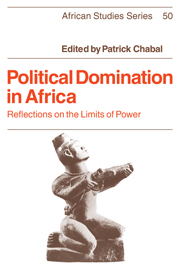Book contents
- Frontmatter
- Contents
- Acknowledgements
- Introduction: Thinking about politics in Africa
- 1 Democracy in Africa
- 2 Politics and vision in Africa: the interplay of domination, equality and liberty
- 3 Democracy and ethnocentrism
- 4 Wails and whispers: the people's voice in West African Muslim politics
- 5 Revolutionary democracy in Africa: the case of Guinea-Bissau
- 6 Civil society in Africa
- 7 Political accountability in African history
- 8 The politics of representation and good government in post-colonial Africa
- Notes
- Index
7 - Political accountability in African history
Published online by Cambridge University Press: 26 January 2010
- Frontmatter
- Contents
- Acknowledgements
- Introduction: Thinking about politics in Africa
- 1 Democracy in Africa
- 2 Politics and vision in Africa: the interplay of domination, equality and liberty
- 3 Democracy and ethnocentrism
- 4 Wails and whispers: the people's voice in West African Muslim politics
- 5 Revolutionary democracy in Africa: the case of Guinea-Bissau
- 6 Civil society in Africa
- 7 Political accountability in African history
- 8 The politics of representation and good government in post-colonial Africa
- Notes
- Index
Summary
People talk about capitalism as one mode of development and communism or socialism as another mode, but at least they're both on the move, using different paths. They have something in common, namely a certain level of social integrity, a certain national character, a demand for accountability. All of which is missing in most of the third world. But without it, your capitalism or your socialism, or whatever it is, isn't going to work.
Flight-Lieutenant Jerry Rawlings of Ghana, April 1982ARGUMENT
What is, and what should be, the relationship between politics and production, between the forms of rule and the rewards of work? These are fundamental questions. The gulf between them, between what is and what should be, is the issue which underlies political debate everywhere. It is a moral issue rather than a theoretical one, to do with people rather than systems. In theory one can analyse how a particular political system must productively function; but that must never be confused with predicting the thoughts and actions of the men and women who live and work within it. It is the argument of this chapter that there is not and never has been any constant equation between politics and production. Their relationship has gone through a number of cycles in African history. Force has proved to be as fruitful as agreement, principled violence as destructive as fainthearted compromise. It would be nice but over-trusting to argue that responsible rulers will always, in the nature of things, share the profits they deserve with their industrious citizens, while tyrants must inevitably impoverish themselves no less than their slaves. It is possible for democracies to starve while despotisms flourish.
- Type
- Chapter
- Information
- Political Domination in Africa , pp. 126 - 157Publisher: Cambridge University PressPrint publication year: 1986
- 46
- Cited by

